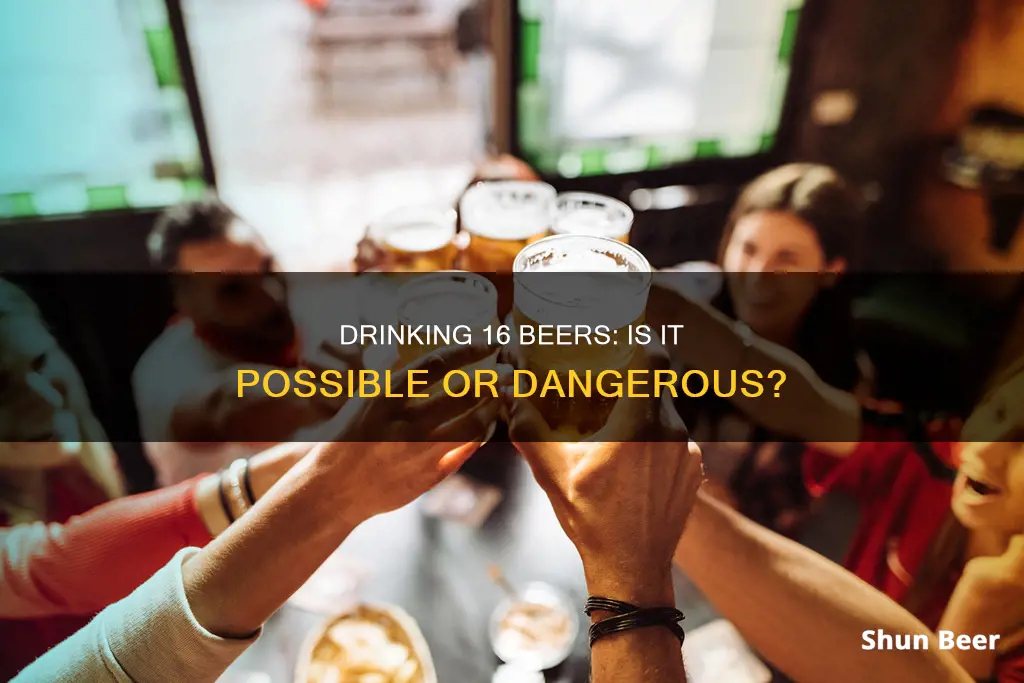
Drinking 16 beers in a day can have serious negative impacts on your health, daily life, and longevity. While moderate alcohol consumption has been linked to certain health benefits, excessive drinking is linked to a host of negative health outcomes. Heavy drinking is defined as consuming more than four drinks on any day for men and more than three drinks for women. Drinking 16 beers in a day would far exceed this threshold and could lead to health problems such as liver disease, high blood pressure, stroke, and certain types of cancer. It can also increase the risk of mental health issues such as depression and anxiety, and cause social and relationship problems. Additionally, drinking large amounts of alcohol can impair your cognitive function, leading to difficulties with memory, concentration, and decision-making.
| Characteristics | Values |
|---|---|
| Number of beers considered excessive drinking for men | 5 or more beers within two hours or 15 or more beers each week |
| Number of beers considered excessive drinking for women | 4 or more beers within two hours or 8 or more beers in a week |
| Number of beers considered binge drinking for men | 5 or more beers within two hours |
| Number of beers considered binge drinking for women | 4 or more beers within two hours |
| Number of beers considered heavy drinking | More than 4 beers on any day for men or more than 3 beers for women |
| Number of beers a 180-lb man can drink in an hour and keep his Blood Alcohol Concentration (BAC) under the legal limit of .08% | 3.5 regular 12-ounce beers |
| Number of beers a 140-lb woman can drink in an hour and keep her Blood Alcohol Concentration (BAC) under the legal limit of .08% | 2.5 regular 12-ounce beers |
What You'll Learn

How much beer is too much?
Drinking 16 beers in a day is well beyond what is considered safe for most individuals and can lead to serious health, social, and economic problems. The amount of alcohol deemed safe varies from person to person, depending on factors such as age, gender, weight, and overall health. Generally, moderate drinking is defined as one drink per day for women and up to two drinks per day for men. Consuming more than this on a regular basis is considered heavy drinking, which can have detrimental effects on one's health and well-being.
Excessive alcohol consumption, such as drinking 16 beers in a day, can overload the liver, leading to inflammation, fatty liver disease, and even cirrhosis. The liver is responsible for filtering toxins from the body, and heavy drinking can cause it to become overwhelmed and unable to function properly. Additionally, drinking large amounts of beer can increase the risk of developing chronic diseases such as heart disease, high blood pressure, and certain types of cancer.
The impact of excessive beer consumption is not limited to physical health. It can also have significant detrimental effects on mental and emotional well-being. Heavy drinking is associated with an increased risk of mental health problems such as depression and anxiety. Alcohol acts as a depressant, exacerbating feelings of sadness, anxiety, and stress, and can contribute to the development or worsening of mental health conditions. Furthermore, excessive drinking can impair cognitive function, leading to difficulties with memory, concentration, and decision-making.
Excessive alcohol consumption can also have social consequences, straining relationships and negatively impacting social interactions. It can lead to behavioural changes, such as aggression and irritability, and cause individuals to become unreliable or difficult to be around, resulting in isolation and a decline in overall quality of life. Additionally, heavy drinking can affect performance at work or school, impairing cognitive function and decreasing productivity. The financial cost of purchasing a large number of beers can also add up quickly, leading to financial strain and instability.
In summary, drinking 16 beers in a day is far beyond safe levels of alcohol consumption and can have severe negative consequences on physical and mental health, social relationships, and various aspects of daily life. It is important to prioritise health, seek support if needed, and explore healthier alternatives and moderation to lead a balanced and fulfilling life.
Beer and Polycythemia Vera: What You Need to Know
You may want to see also

What are the health risks of drinking 16 beers?
Drinking 16 beers in a day is considered excessive drinking and can lead to serious health risks. Excessive drinking is categorised into two types: binge drinking and heavy drinking. Binge drinking is defined by the CDC as a pattern of drinking that raises a person's blood alcohol concentration (BAC) to 0.08 g/dl or higher. For men, this usually occurs after consuming five or more drinks within two hours, while for women, it takes four or more drinks within the same time frame. On the other hand, heavy drinking is defined as drinking eight or more drinks per week for women, and 15 or more drinks per week for men.
Drinking 16 beers in a day far exceeds these limits and can have severe short-term and long-term health consequences. Here are some of the potential health risks associated with consuming 16 beers:
- Unintentional injuries, such as car crashes
- Violence, including domestic violence, sexual assault, and homicide
- Risky sexual behaviours, which may result in unintended pregnancies and STIs
- Miscarriage, stillbirth, or fetal alcohol syndrome in pregnant women
- Memory and learning problems
- Early and permanent dementia
- Inflammation and damage to tissues and organs
- Chronic diseases, such as liver disease, heart disease, stroke, high blood pressure, and various types of cancer
- Ulcers and other gastrointestinal issues
- Malnourishment and vitamin deficiencies
- Weakened immune system
- Higher risk of obesity
- Mental health issues, such as depression and anxiety
- Sleep disruption, leading to poor sleep quality and increased fatigue
- Social and relationship issues
- Legal consequences, such as fines, license suspension, or incarceration due to drinking and driving, underage drinking, or public intoxication
Excessive alcohol consumption can also negatively impact your personal and professional life, leading to decreased productivity at work, job loss, financial issues, and problems with friends, family, and romantic relationships.
It is important to note that the effects of drinking 16 beers can vary depending on factors such as gender, body weight, age, and individual tolerance. Additionally, mixing beer with other alcoholic beverages or drugs can further increase the risks and adverse effects.
Impossible Beer Challenge: 30 Beers in 2 Hours?
You may want to see also

How does drinking 16 beers affect mental health?
Drinking 16 beers in a day is considered excessive drinking and can have detrimental effects on one's mental health. While the immediate impact of alcohol may be feeling relaxed, less anxious, and more confident, these effects are short-lived. As the alcohol wears off, the chemical changes in the brain can lead to more negative feelings, such as anger, depression, or anxiety.
Alcohol is a depressant that interferes with the balance of neurotransmitters in the brain, affecting one's feelings, thoughts, and behavior. It particularly affects the part of the brain that controls inhibition. With regular heavy drinking, individuals may find themselves in a cycle of dependence, drinking more to relieve negative feelings. This can lead to alcohol use disorder (AUD).
Excessive drinking is also associated with an increased risk of mental health problems, including anxiety and depression. For individuals with pre-existing mental health issues, alcohol can exacerbate these conditions. Drinking to cope with difficult feelings or symptoms, also known as "self-medicating," is common but can lead to a problematic relationship with alcohol.
In addition to the direct impact on mental health, excessive drinking can also contribute to social problems, such as relationship issues, unemployment, financial difficulties, and homelessness, all of which can further affect one's mental well-being.
Drinking and Driving: Half a Beer, Is it Safe?
You may want to see also

What are the social consequences of drinking 16 beers?
Drinking 16 beers in one sitting is considered excessive drinking and can have various social consequences. Here are some of the potential social implications of consuming 16 beers:
Impact on Work and Career
Excessive alcohol consumption can negatively impact an individual's work performance and career prospects. This includes increased absenteeism, a higher risk of workplace accidents, reduced productivity, and even unemployment. According to a survey in Australia, workers with drinking problems are nearly three times more likely to have injury-related absences from work. In terms of productivity, heavy drinking can lead to a perceived lack of self-direction and problems in personal relationships, which can hinder one's effectiveness in the workplace.
Financial Problems
Drinking 16 beers can contribute to financial difficulties due to the excessive spending on alcohol itself, as well as the potential loss of income resulting from unemployment or reduced productivity. Additionally, there may be increased medical and legal expenses associated with alcohol-related health issues and legal troubles.
Relationship and Family Issues
Consuming a large amount of alcohol can strain personal relationships and impact one's family life. Alcohol can impair an individual's decision-making skills, emotional processing, and self-control, increasing the risk of aggression and violence within intimate partner relationships. Alcohol abuse can also lead to child neglect and abuse, with children of parents struggling with alcohol addiction being more susceptible to developing alcohol use disorders themselves.
Social Stigma and Isolation
Excessive drinking can lead to social stigma and isolation. Embarrassing or humiliating incidents, such as vomiting or passing out in public, can result in ridicule, social ostracism, and bullying. Additionally, heavy drinkers may find themselves socializing primarily with other people who also drink to excess, limiting their social circle and support system.
Legal Consequences
Drinking 16 beers can increase the risk of alcohol-related offences, including assault, sexual assault, property damage, disorderly behaviour, and drunk driving. These offences can lead to arrests, jail time, community service, and a criminal record, further impacting employment prospects and relationships.
Impact on Community and Society
The consequences of excessive alcohol consumption extend beyond the individual and can have a broader impact on the community and society. This includes increased costs to society in terms of healthcare, criminal justice, and social services. Alcohol-related violence and accidents contribute to these costs and negatively affect the well-being of the community.
Beer and Azithromycin: A Safe Mix?
You may want to see also

What are the financial and legal risks of drinking 16 beers?
Drinking 16 beers in one sitting is binge drinking and is considered excessive. Excessive drinking can lead to a range of health, financial, and relationship problems. While the financial and legal risks of drinking 16 beers are not directly addressed in the sources, the negative consequences of excessive drinking are well-documented and often involve financial and legal issues. Here are some potential financial and legal risks associated with drinking 16 beers:
Financial Risks:
- Loss of income and increased expenses: Excessive drinking can lead to decreased productivity at work, job loss, and subsequent financial issues. This can include losing one's job due to poor performance or attendance, as well as increased expenses related to drinking large amounts of alcohol.
- Healthcare costs: Long-term excessive drinking can lead to serious health problems, including liver disease, heart disease, cancer, and other chronic illnesses. This can result in costly medical bills and long-term treatment expenses.
- Legal fees: If excessive drinking leads to legal problems such as arrests or lawsuits, there may be significant legal fees involved. This could include fees for lawyers, court costs, and other related expenses.
Legal Risks:
- Driving under the influence: Drinking and driving is illegal and can result in serious legal consequences, including arrest, fines, license suspension, and even jail time.
- Violence and assault: Excessive drinking can increase the risk of violence, including domestic violence, sexual assault, and homicide. These actions have serious legal consequences and can lead to criminal charges and incarceration.
- Unintentional injuries: Excessive drinking can lead to unintentional injuries, such as car crashes, falls, or other accidents. If these incidents result in property damage or injury to others, there may be legal consequences and financial liabilities.
- Underage drinking: If an individual under the legal drinking age consumes 16 beers, there can be legal consequences such as fines, suspension of driver's license, or other penalties.
- Public intoxication: In some places, public intoxication is illegal and can result in arrest or fines.
Non-Alcoholic Beer: Safe for Liver Disease Patients?
You may want to see also
Frequently asked questions
Drinking and driving is never advisable. However, the legal blood alcohol limit in the US is .08%. A 180-lb man may be able to drink 3.5 regular 12-ounce beers in an hour and keep his blood alcohol concentration (BAC) under this limit. A 140-lb woman may be able to consume 2.5 regular beers in an hour and maintain a BAC of less than .08%.
Drinking 16 beers in a day is well above the threshold for heavy drinking and could lead to a number of health problems, including liver disease, high blood pressure, stroke, and certain types of cancer. It can also cause nutritional deficiencies, memory loss, difficulty concentrating, impaired decision-making skills, and an increased risk of developing mental health issues such as depression and anxiety.
Binge drinking is defined by the Centers for Disease Control and Prevention (CDC) as consuming enough alcohol to bring a person's blood alcohol concentration (BAC) to 0.08 g/dl or above. For men, this typically happens after consuming five or more drinks within two hours. For women, binge drinking is defined as consuming four or more drinks within two hours. Heavy drinking is defined as drinking eight or more drinks per week for women and 15 or more drinks per week for men.







